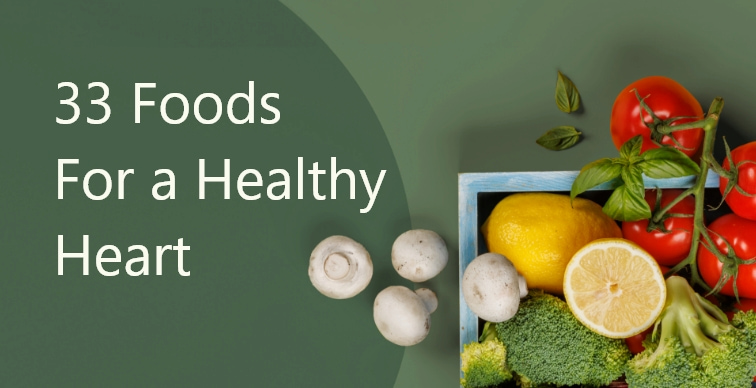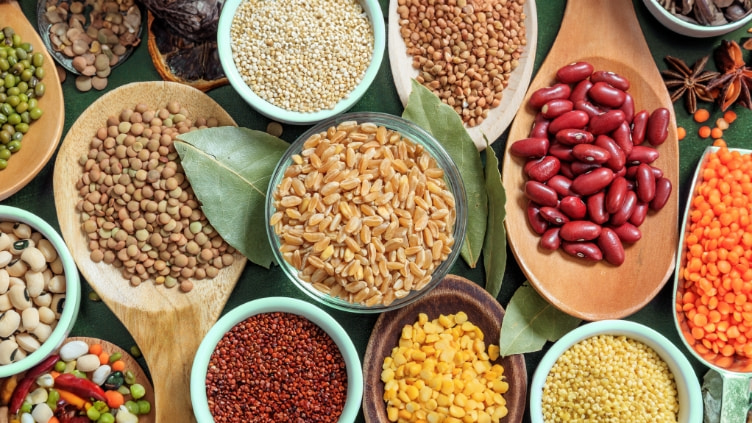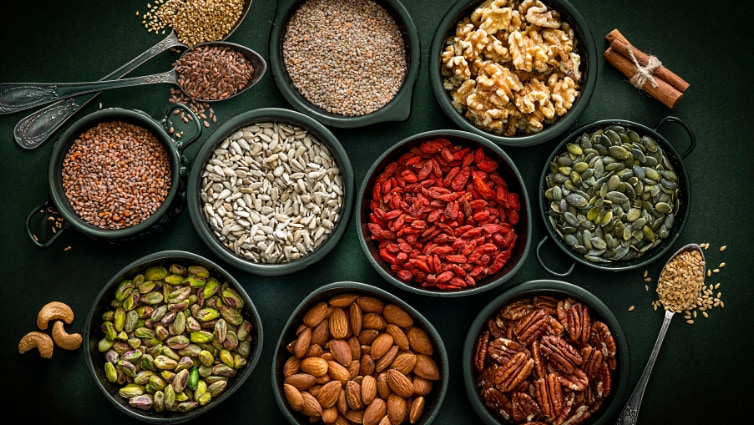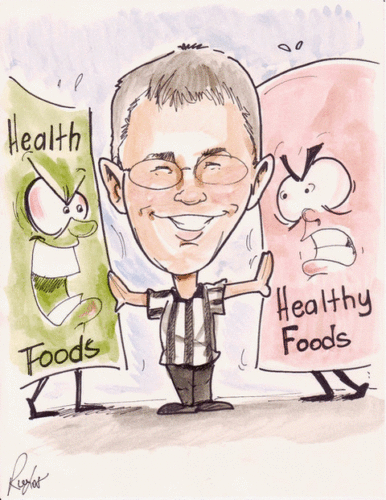33 Foods For a Healthy Heart
Updated December 2, 2023

When you eat SAD (Standard American Diet), sugars and fat often turn into plaque that builds up in your arteries. Plaque restricts blood flow and can lead to a heart attack. Not to mention causes high cholesterol and high blood pressure, which also increases your chance of having a heart attack.
Luckily, there are plenty of foods for a healthy heart that are tasty. Keep reading to learn about some standout foods to make the star of your next meal.
Fruits
Naturally sweet and full of vitamins, fruits are tasty foods for a healthier heart.

Apple
One study found that eating whole apples (meaning the skin, too) was connected with a reduced risk of heart disease, ischemic heart disease deaths, and fatal strokes. Apples are known to reduce bad cholesterol and blood pressure while increasing good cholesterol and heart and blood vessel function.
The same study says consuming 100 to 150 grams a day of whole apples can lower your risk of developing heart disease.
Avocado
Avocados offer a source of healthy fats while reducing cholesterol. One study found that people who had two servings of avocado a week had a 16% lower risk of heart disease and a 21% reduced risk of coronary heart disease.
Banana
Bananas are full of fiber, which can help prevent bad cholesterol from building and lowering the risk of heart disease. Bananas are also known for being an excellent source of potassium—which causes nerves to talk to each other and ensure your heart beats regularly. Potassium also helps prevent your arteries from hardening.
Blueberry
While all berries are good for the heart, blueberries stand out because of the high amount of anthocyanidin. They help prevent oxidative stress from hardening the plaque in the arteries and causing the pathways to narrow. They also prevent cell damage and help to balance good and bad cholesterol.
Cherry
Cherries are full of antioxidants, potassium, and vitamins that all improve heart health. They have an antioxidant called anthocyanins, which helps protect the blood vessels.
Grapefruit
Grapefruit is an excellent choice for heart-healthy meals if you don’t take certain medications (they can interfere with the effects of statin, allergy medicine, and other medications).
Grapefruits are loaded with vitamin C and potassium. They also contain phytochemicals, specifically flavonoids, that can help prevent heart disease.
Orange
Oranges are an excellent provider of potassium, which assists with controlling blood pressure. Potassium helps relax blood vessels, ensuring they don’t get too stiff—which makes adjusting to blood flow difficult.
They’re also full of fiber and vitamins.
Peach
Peaches are another great source of potassium (see bananas and oranges), which helps regulate blood flow and your heartbeat.
Pomegranate
Pomegranates are known for being a superfood because of the polyphenol compounds— punicalagin or ellagitannins—that help prevent artery walls from thickening. They also prevent plaque from building up. This combination makes your arteries wider and blood flow easier.
Strawberry
This berry improves endothelial function. The endothelium is the small lining in the walls of the heart and blood vessels. Improving its function means that the heart can do its job efficiently and ensure circulation is good throughout the body.
Vegetables
Here are the best vegetables to help with heart health.

Asparagus
This vegetable contains folate, which prevents homocysteine from building up. This is important because it can cause damage to your blood vessels. It also has fiber that will bind to cholesterol and get rid of it through bowel movements instead of absorbing cholesterol into your body.
Bok Choy
Bok choy is loaded with folate and vitamin B6, which removes homocysteine from your blood. It also has magnesium, calcium, and potassium as well.
Broccoli
Broccoli contains sulforaphane to help reduce inflammation of the entire body—which is good for your heart and circulatory system.
It’s also a cruciferous vegetable. A study found that increasing this type of vegetable can help prevent subclinical atherosclerosis in older women.
Cabbage
Cabbage includes more than 36 different anthocyanins, preventing plaque and artery hardening.
Edamame
Edamame is loaded with fiber, which is crucial for heart health and managing cholesterol levels. The fiber slows digestion and prevents bad cholesterol from getting into your bloodstream.
Okra
This veggie has a specific antioxidant called polyphenols. In other words, vitamins A and C. Polyphenols are good for your heart because they prevent blood clots and reduce free radical damage.
It also has a substance called mucilage, which binds to cholesterol and allows the cholesterol to leave your body instead of getting absorbed.
Romaine Lettuce
Full of potassium and vitamins A and C, romaine lettuce is an excellent go-to for maintaining heart health. It prevents plaque from building up while ensuring your heart continues to beat steadily.
Spinach
Spinach contains nitrates. This is important because one study found that nitrates open up your blood vessels and prevent them from getting stiff. It’s also full of magnesium, which helps maintain a healthy heartbeat.
Sweet Potato
Sweet potatoes provide your body with fiber and potassium, which helps control cholesterol levels and reduce the chance of heart disease developing.
Swiss Chard
Minerals like potassium and magnesium are featured in Swiss chard. This veggie can help with controlling your blood pressure. It also has fiber, antioxidants, and vitamin A.
Tomato
Tomatoes are loaded with various nutrients like fiber, folate, potassium, and vitamin C, which all help keep your heart healthy. These nutrients work together to reduce bad cholesterol, control blood pressure, and prevent the arteries from stiffening.
Many studies have shown that a tomato-rich diet can reduce the risk of heart disease.
Whole Grains
Whole grains are some of the best foods for a healthy heart. A study showed that eating whole grains reduces the risk of heart disease, coronary heart disease, and many more conditions.

Barley
Barley’s fiber can help lower cholesterol and blood sugar levels, reducing heart damage.
Brown Rice
Another good source of the fiber that binds itself to cholesterol is brown rice. Brown rice also has magnesium and an antioxidant called lignans that help with overall heart health.
Oat
Oats are a beta-glucan fiber that helps reduce cholesterol levels by attaching themselves to the cholesterol and getting rid of it. One study found that eating three grams a day of the beta-glucan provided in oats reduced bad cholesterol in participants by up to 10% and reduced the risk of heart disease by 20%.
Quinoa
Whole grain quinoa is full of fiber and antioxidants, which can help prevent damage to your heart from free radicals, cholesterol, and plaque.
Plant-Based Proteins
Protein-based food is good for a healthy heart and the rest of your body.

Chickpea
Chickpeas contain omega-3 fatty acids, which help with cholesterol and diminish plaque buildup in your arteries. One study found that chickpeas have higher amounts of soluble fiber and protein than other legumes.
Legume
One study found that regularly eating legumes can reduce your risk of heart disease by 11%. This is because legumes reduce the levels of bad cholesterol in your blood. The same study found that eating legumes helped people with cholesterol problems by lowering bad cholesterol by 7.9% and total cholesterol levels by 8.3%.
Lentil
Lentils provide folate that supports the creation of red blood cells. They also have iron and vitamin B1, which support heart health. One study of 39 patients found that the group given lentil sprouts had better levels of serum lipid profiles (levels of fat in your blood), which affects the heart.
Tofu
Tofu, made from soybeans, is an excellent source of minerals, healthy fats, and fiber. One study found that eating tofu was connected to a moderately lower risk of heart disease—especially in young or post-menopausal women.
Nuts and Seeds
When kept to a minimum, eating nuts and seeds is a healthy snack option that offer different proteins, fibers, minerals, and more. Here are some standouts.

Almond
The almond nut is proven to help lower bad cholesterol levels. It contains healthy fat, fiber, potassium, vitamin E, and magnesium.
Chia Seed
High in fiber, omega-3, and an antioxidant called quercetin—chia seeds can keep you from developing various conditions. For heart health, its fiber can lower blood pressure and regulate heartbeat rhythm.
Flaxseed
The flaxseed has fiber, lignans, and omega-3 fatty acids, all of which reduce inflammation and stop cholesterol from building up in your blood vessels. Flaxseed can also help improve heart function through its antioxidants and omega-3 acids.
Walnuts
Walnuts can lower bad cholesterol and help protect your heart from inflammation. This is because this nut has omega-3s, healthy fats, antioxidants, and fiber.
Time to Create Some Heart-Healthy Meals
Want to add more of these foods for a healthy heart to your meals? Luckily, Dr. McDougall has a large catalog of recipes that feature the best foods for a healthy heart diet. Don’t fear—you don’t have to give up taste for health—each recipe is delicious!
Need something a little more detailed?
Check out our heart disease diet plan!
Recommended Articles

The 10 Most Healthful Packaged Foods

The Scientific Publications of Dr. Walter Kempner: Creator of the Rice Diet
![Can Diabetics Eat Popcorn [and 12 Other Common Foods]?](https://www.drmcdougall.com/wp-content/uploads/2023/09/popcorn-500x333.jpg)





